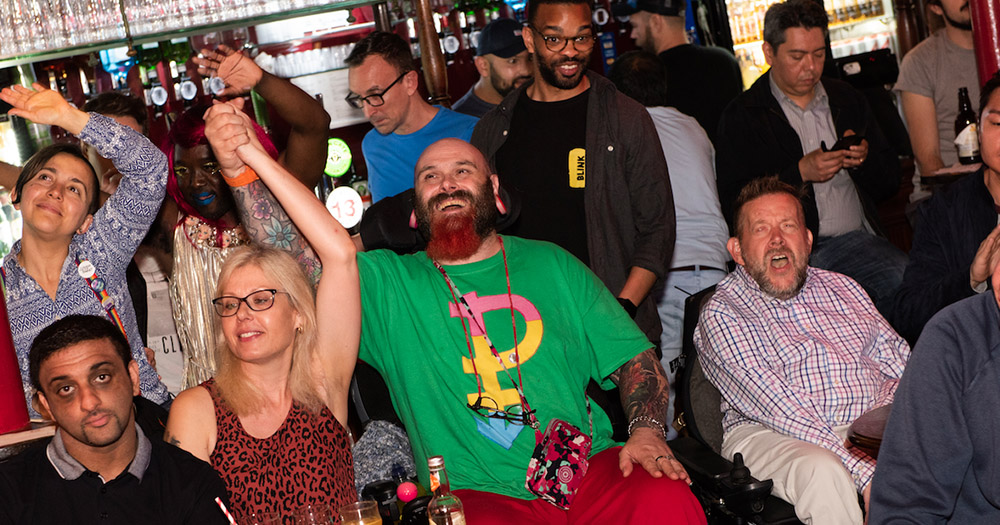London’s first-ever ParaPride was a powerful declaration on the importance of inclusion for people with disabilities and on addressing discrimination within the LGBT+ community.
Amazing @Parapride 2019 pic.twitter.com/nGqcxdzvos
— LGBTConstruct?ChristinaRiley?PrideInCONSTRUCTION (@LGBTconstruct) August 17, 2019
The event on Saturday August 17, saw the Royal Vauxhall Tavern host several hundred people for an afternoon of panel discussions and stage acts. One of the performances was by performance poet and disability activist, Ruthie Adamson, who performed as the character Wonky Wordsmith.
https://twitter.com/ChrisJepson/status/1163545657011003399
Adamson spoke about how discrimination can take many forms, illustrating how she experienced “disablism” from a partygoer at a recent event.
“As soon as she walked in and saw me and saw my delightfully deformed digits, she sneeringly said, ‘A lesbian with one hand?'”
Domenico Pasquariello, a former teacher, spoke about the necessity for LGBT+ venues to become more accessible, as well as the need for the LGBT+ community to address how it views disabled people.
“We want people to know that there are people within the LGBT+ community who are disabled and we don’t want people to discriminate (against) disability within the community,” Pasquariello told the Thomson Reuters Foundation.
https://twitter.com/LGBTDisability/status/1162736409708548096
Disabled LGBT+ people at London's first ever ParaPride hope that the LGBT+ community will become more inclusive | #LGBT+ pic.twitter.com/5gLSJQaSyC
— Openly ?️? (@Openly) August 19, 2019
In July 2019, there was a community fundraiser to get a chairlift installed in the Oxford LGBT+ club Plush to make it more disability-friendly. Paul Scarrott, a trustee of an Oxford disability charity, said: “People with disabilities want to have a fun night out too and there are not enough places in Oxford where this is possible. We hope their example will lead others to improve access too.”
The community raised £11,000, showing a clear desire for creating inclusive spaces for everyone in the LGBT+ community. However, there is still much work to be done in terms of visibility on an international level.
In GCN Issue 348, Paddy Smyth, gay activist and host of the new RTÉ fashion show The Fitting Room, discussed dating as a differently-abled person: “Disabled people are treated like babies, like newborns, people are very protective. I think that’s a lot of why they can’t find someone with a disability attractive – because society’s instinct is to protect them and keep them safe like we’re going to shatter.”
Having the chance to present The Fitting Room was a life-changing moment for Smyth: “For me, I hope it shows that no matter your disability… you can achieve what you want to achieve. I always dreamed of being a presenter but didn’t think it was possible because society told me so. I hope it shows that the disabled community are heard and we are listened to, and in this show, we are included in a positive way.” He also spoke about his experiences as part of the live Call It Out panel.
Continuing the push for representation and visibility is crucial in breaking the stigma around disabilities. Events such as ParaPride are powerful examples of how to further these ongoing discussions.
© 2019 GCN (Gay Community News). All rights reserved.
Support GCN
GCN is a free, vital resource for Ireland’s LGBTQ+ community since 1988.
GCN is a trading name of National LGBT Federation CLG, a registered charity - Charity Number: 20034580.
GCN relies on the generous support of the community and allies to sustain the crucial work that we do. Producing GCN is costly, and, in an industry which has been hugely impacted by rising costs, we need your support to help sustain and grow this vital resource.
Supporting GCN for as little as €1.99 per month will help us continue our work as Ireland’s free, independent LGBTQ+ media.

comments. Please sign in to comment.